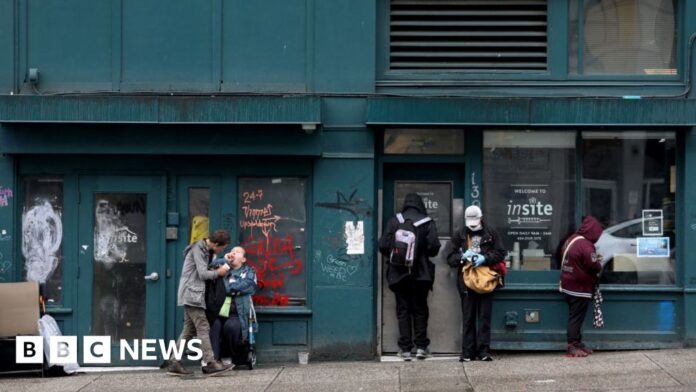“Canada’s Drug Decriminalisation Reversal: A Shift in Policy”
In a surprising turn of events, the Canadian province of British Columbia has decided to recriminalise the use of hard drugs in public spaces, marking a significant rollback of a groundbreaking policy aimed at addressing the deadly opioid crisis. This decision has sparked a debate on the efficacy of decriminalisation and its impact on public safety.
The Shift in Policy
The decriminalisation project in British Columbia, which commenced in January 2023 as a three-year pilot programme, allowed adults to possess small amounts of heroin, fentanyl, cocaine, or methamphetamine without fear of arrest or drug seizure. However, concerns about public disorder and drug use have led to a reevaluation of this policy. As a result, police will once again have the authority to address drug use in all public locations, including hospitals, restaurants, parks, and beaches.
Proponents of the reversal argue that while they are empathetic towards individuals struggling with addiction, they cannot ignore the impact of street disorder on community safety. This shift in policy reflects a desire to strike a balance between compassion for those in need and maintaining public order.
The Impact of Decriminalisation
The decision to recriminalise drug use in public places has sparked a discussion about the effectiveness of decriminalisation in combating the opioid crisis. With fatal overdoses on the rise in both the US and British Columbia, there is a pressing need to explore alternative approaches to address drug addiction and its consequences.
Opponents of the decriminalisation reversal have criticised it as a harmful experiment that has failed to reduce overdose deaths. They argue that the lack of safeguards for the public has allowed illicit drug use to proliferate in public spaces, posing a threat to public health and safety.
Looking Ahead
As the debate over drug policy continues to evolve, it is essential to consider the impact of these decisions on individuals struggling with addiction, as well as the broader community. Finding a balance between compassion and public safety remains a formidable challenge, but one that must be addressed in order to effectively combat the opioid crisis.
The reversal of the decriminalisation policy in British Columbia serves as a reminder of the complexities involved in addressing addiction and drug use in society. It prompts us to reevaluate our approach to drug policy and consider innovative solutions that prioritize both public health and community well-being. Ultimately, the path forward requires a thoughtful and nuanced approach to tackling the opioid crisis and supporting those affected by addiction.”
Reference















